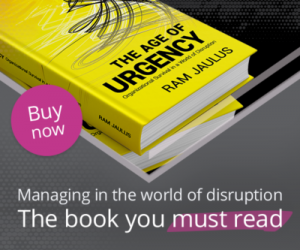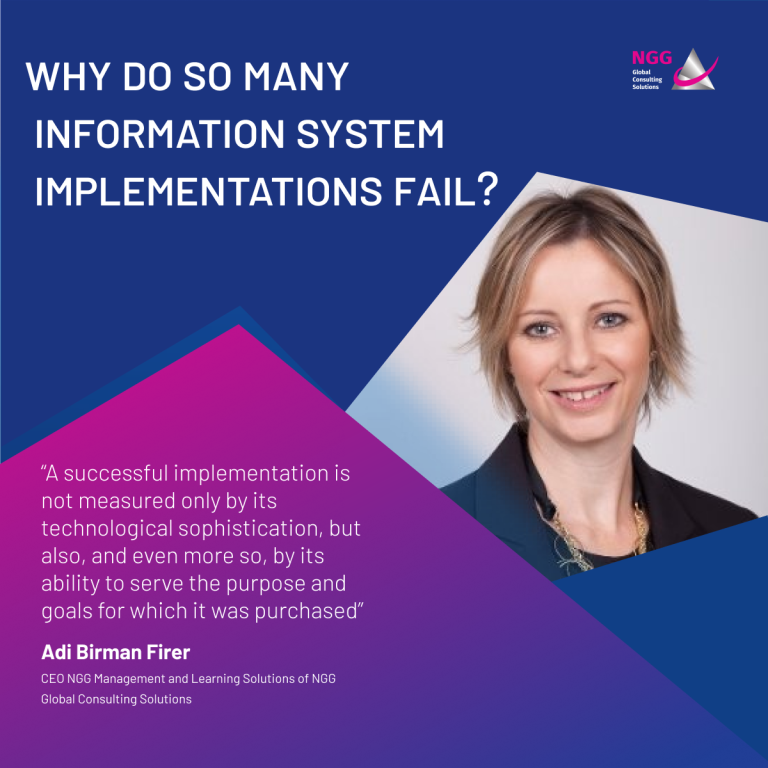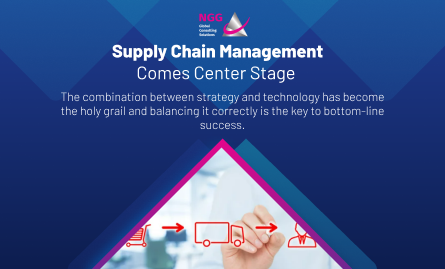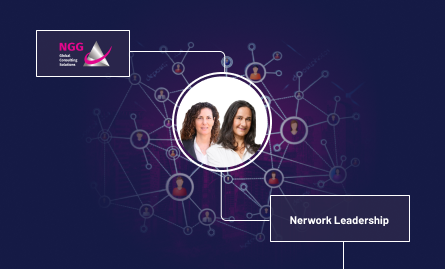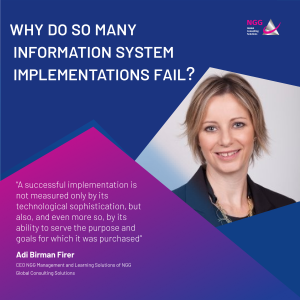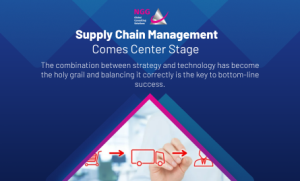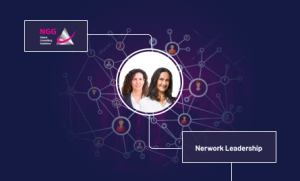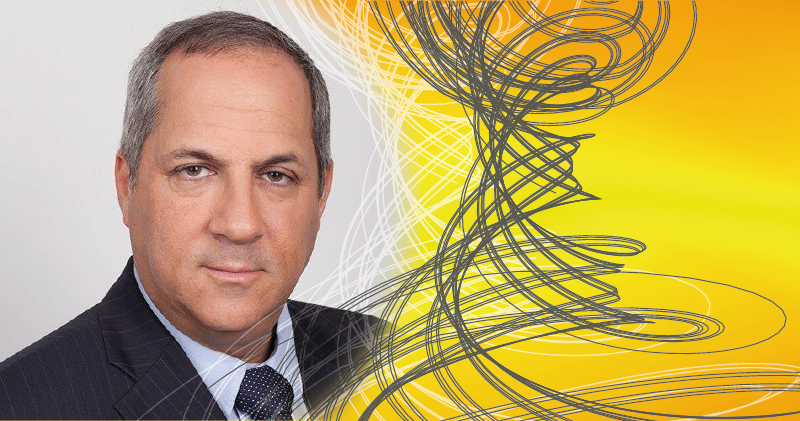
In a constantly changing world, organizations must reinvent themselves. Existing organizations must reinvent themselves without delay, not in the clichéd sense of the term, but through a profound change in the organizational DNA. Read the first chapter of Ram Jaulus’ book
In the past, we believed that a successful change was based on a plan and a correct preparation, and therefore the organization must prepare in the best possible manner before embarking on it. Today the situation is different than ever, and the rate of change has become the leading engine of the changes themselves. Existing organizations must reinvent themselves without delay, not in the clichéd sense of the term, but through a profound change in the organizational DNA – a change in the fundamental way in which decisions are being made, in the way the organization operates. In a world that changes so quickly, there is no practical possibility of predicting or preparing for the next change in the traditional thinking framework.
With a sharp and clever scalpel, Ram Jaulus dissects in his new book “The Age of Urgency – Organizational Survival in a World of Disruption”, contemporary reality. He identifies the current failures apparent in organizations of every type and size, explains strange phenomena occurring around us at this very moment, and provides fascinating and constructive forecasts for managing an inevitably chaotic future. . The book is a must-read for every manager who tries to navigate the current era.
The Great Comeback of Rumors and Beliefs
For thousands of years, human society has been driven by rumors and beliefs.
How greatly have these influenced the course of history?
Let us review.
Faith and religious beliefs are the greatest cause of violence in human history, instigating countless wars, fueling the Christian Crusades, the holy wars of Islam (most of them between different Muslim factions), the conquest of America by the Spaniards, and many others.
For hundreds of years, sailors were afraid to sail far and wide. Why? Because they believed the world was flat, and upon reaching the edge were certain they would fall into an endless abyss. In the Middle Ages, women were burned at the stake, due to a satanic combination of faith “We must burn witches!” and rumor “This woman is a witch”. We have yet to mention the “alternative facts” we believe in today.
Over the years, we have wanted to believe that man is evolving and gaining greater and greater degrees of enlightenment. After all, humanity flaunts a distinguished resume full of scientific, medical, and technological accomplishments. But have we really evolved as a race? Has human nature itself changed?
Good question.
We will attempt to answer it using the most “scientific” method: science itself.
For centuries, scholars and sages (along with clerics and politicians) were regarded as authority figures guiding humanity. These scholars and scientists were concerned with the advancement of human knowledge, in the documentation of various facts, in research, and in learning. Researchers around the world vied for empirical proof for a range of phenomena via experimentation.
This knowledge was documented in articles, which, in turn, were published in journals.
But something interesting happened along the way. Somehow, the focus was no longer on the scientific discovery itself, but on the fact that it had been published.
Hard to believe? Think about the inventor of the telephone. Was it Alexander Graham Bell? Not according to the US Congress. In 2002, Congress officially recognized the Italian immigrant, Antonio Meucci, as the inventor of the telephone, many years before Bell did the same. To his misfortune, Meucci did not have sufficient funds to register for a permanent patent, so his invention was lost in the corridors of history.
According to Congressional findings, Bell, who worked in the same laboratory where Meucci’s materials had been stored, simply found the Italian immigrant’s notes. The rest is history.
This, of course, is not the only such case. Every scientist today knows that if research is not published in a notable journal, it might as well not have been conducted. This has always been the case. Across generations, the academic world has considered the publication of scientific research in professional journals as the ultimate achievement of the researcher, and has even based academic degrees on these publications. Today, the academic route for earning an advanced degree even necessitates the publication of several articles in recognized scientific journals.
*
Let’s look at a more popular science.
For years, having an encyclopedia set at home was a source of pride and status. Encyclopedias were expensive and prestigious, and generations of students paged through them for hours. These leather-bound volumes were a certified source of humanity’s knowledge. The more entries the encyclopedia contained, and the more extensive it was, the more complete and precise it was considered.
How was this knowledge for the masses attained? From published studies and research, of course.
Nevertheless, as human knowledge and understanding progressed, encyclopedias needed frequent updates. Then came the obvious question: if an update is needed, then how did we deem the previous information credible? This task concerned the editors, who attempted to answer this question by adding numerous supplementary volumes.
Information Instead of Knowledge, Opinions Instead of Facts
As the internet revolution surged across the world, it rendered the encyclopedia obsolete, overthrowing its status as a source for all information and knowledge. It seemed as if the problems of gathering and updating knowledge were solved. Today, information flows almost autonomously, anywhere and everywhere.
The internet has given everyone a voice. Anyone can post information, and this information is available to all readers. Any material can be read or seen by anyone, anywhere, at any time – a dream come true for an accessible digital realm.
But does this information represent knowledge? Real, proven knowledge, not based on beliefs or rumors?
The answer is well known to us all. The information, so available and up-to-date on the internet, is assembled and uploaded by anyone. The voice of a scientist who has conducted ten years of research and established a clear scientific claim is equal, on the internet, to the voice of any one ordinary person who simply “thinks differently.”
Perhaps because this one ordinary person has more friends or a greater social presence, the social proof for his claim is stronger than scientific proof. After all, who has time to read scientific articles? Who understands them anyway? The tools for checking reliability and validity are pushed aside. It has become more logical to support a more popular standpoint.
Welcome to the age of Wikipedia, endless available information, and fake news.
*
In the years 2016-2018, we are experiencing a dramatic change in the internet users’ perception of reality. The most authoritative sources of information are considered to be found in Wikipedia.
Most are not aware of the bloody battles taking place there, behind the scenes; most do not know how deeply beliefs, rumors, worldviews and emotions run on this platform.
Wikipedia is edited by contributors who operate in a kind of digital democracy. These are individuals who are not necessarily experts in their field. They can write, edit, change and influence with no limit – the only supervision comes in the form of other editors.
The result: Wikipedia has become the most popular source of information in the world, and additionally, is perceived as credible and accurate – even though it is neither reliable nor factual. The encyclopedia is now an old-fashioned concept that has virtually disappeared.
But this is just the beginning of the “accessible information” revolution.
With Wikipedia, there is, to a certain extent, some form of supervision, an ability to edit the posts – but most of the material on the internet is posted under no supervision at all. Millions of articles are published daily, some on credible sites and some on sites that have only been designed to look credible. They are perceived as a source of authority, regardless of their reliability and validity. Any content creator becomes an expert, and anyone can choose the data set they favor and turn it into “facts.”
Thus, school students, university academics and researchers are now accessing the information available on the internet and calling it “research.” They see it as valid and reliable information, when in reality it may be far from being so.
Furthermore, the internet may be used by some to sway and propagate “facts” in a certain direction. They do this to bolster their opinion, or to seek revenge on a person or an organization. Whether we condone it or not, social shaming has become a prevalent online trend and an integral part of the information game.
*
Today, a belief is accepted as fact, and a rumor leads to a mass trend following. We have returned to the Middle Ages. Perhaps we never quite left them.
A Change in the Definition of Social Class
Humanity is a hierarchical society. It has clearly defined classes, high and low, determined throughout history as a result of power struggles and heritage.
To illustrate, let us assume that in the struggle between two ancient families over the right to cultivate a plot of land, one family triumphed. From that moment on, this family became wealthier, supported more children and gained even more power. Their wealth passed from one generation to the next, while the patriarch of the victorious dynasty zealously guarded his eldest son’s fortune.
Other relatives were granted part of the stake as well, but those who were not part of the family received nothing. Over time, the family became the tribe, and the first descendant of each original father became the head of the tribe, the chief, the king. Other relatives became counts, dukes, lords, or “just” titled nobility.
Familial and tribal pedigree was a key determinant of status. It insured wealth or poverty for generations to come and was a great barrier for a transition from one class to another. Those who held power and wealth vehemently kept it “within the family” and expected that their children marry the children of other noble families.
*
This system has governed mankind for thousands of years, and to this day casts a profound influence on Western culture. In some cultures, this system is still prevalent, as in the Indian caste system, and in various countries in the Middle East.
Yet, with the decline of empires at the beginning of the 20th century, and the rise of democracy, changes began to surface. Today, primarily in the Western world, a person’s status is largely determined by their qualifications. Although it is true that inherited wealth and a prominent family name still carry weight, status can now be achieved by virtue of social, professional, and business skills.
People who have realized a scientific, literary, artistic, or political achievement are evaluated on the basis of their success. Their status is typically valued higher than that of an “ordinary” person not known for their achievements. Here too, the word “known” is significant. Celebrities, whose status today is considered sky-high, carry such extreme value simply because… they are known. However, someone who is wealthy or wise, and whose fortune or achievements are not publicly known, will not gain this higher status.
*
A higher status is a worthy advantage. People who have accumulated wealth, whether financial or social, receive benefits, many of which they do not pay for. They are afforded preferential treatment by the rest of society and are held in high esteem by their immediate and distant circles.
We see here another interesting phenomenon. At present, it takes less effort to gain a higher status (participating in a reality show, for example, will instantly make you a celebrity), but it is just as easy to lose that status once you achieve it. A rock star who, ten years ago, was chauffeured in limousines and lived a life of abundance and wealth, could today easily fall into a state of poverty and anonymity. In the past, a man could bequeath his nobility (and status) to his children; status today is less a matter of legacy. Value is more dynamic and increasingly determined on the basis of the here and now.
This is a fundamental change in the class system, and it is unlikely to fade from the world, since man remains a social and hierarchical creature. However, the way it manifests in the future will dramatically transform.
In the future, the status of a person will be determined by their ability to be dynamic and adapt to change. The rationale: in a rapidly changing world, the principles of wealth will belong to those who were able to anticipate change. These people will become the leaders of the future because they will be able to ride the changes and prompt others to follow.
This marks the reign of Social Darwinism, in which only the best adapted will survive. The winners will be the ones who adapt themselves better and faster to change – those who are able to adjust to any situation with greater agility. .
*
In the future, enduring leaders will be perceived as successful leaders – not necessarily because they marked any achievements. Endurance will be the key attribute on which people, organizations, and even countries will be evaluated.
The scholars and intellectuals will find themselves in a lower class than before, since their ability to adjust to change is less agile. Others, less scholarly but more adaptive, will occupy the higher ranks in the social hierarchy.
Money and power will not necessarily play the same roles as they did in the past. This is evident in the various organizations that influence world processes – movements and causes that rise daily, sometimes just briefly, but create an effect, lifting or debasing a person in the eyes of the public consciousness and bestowing upon them a new social status.
*
Charles Darwin recognized many years ago that: It is not the strongest of the species that survives, nor the most intelligent that survives. It is the one that is most adaptable to change. He was right, and today there is countless evidence for the validity of the theory of evolution and the insights derived from it. Dinosaurs were the strongest in their era, but mammals and insects could adapt better to changes, whether an asteroid or another tumultuous event.
The changes occurring in today’s human climate will lead to the emergence of several new and prominent social classes. Let us review some of them.
Calculated Influencers
These are the people who will successfully shape public opinion and create a positive status for themselves through the shrewd and calculated use of the tools offered by the New Age. These people will systematically work to position themselves on a specific issue. It can be one that will create a lobby, foster public opinion, lead a process, or a combination of all of these.
Some influencers of this type will act for their own benefit, some will work for the benefit of the public and others will exploit their influence in order to sabotage existing factors.
In the business world, leading tech companies, as well as companies that are breakthrough leaders in the field of consumer habits, such as Amazon, Facebook, Apple and Tesla, are essentially calculated influencers. Some have a great impact on the public and others have less, but all of them have been systematic and purpose-oriented.
Opportunistic Influencers
These are the people who will identify an opportunity or a trend in order to position themselves in the court of public opinion. Occasionally, such an opportunity will present itself through an event, and sometimes – in politics, for instance – an opportunity will result from the exploitation of a rival’s weakness. One can also take advantage of personal weakness in order to create sympathy.
More sophisticated versions of opportunistic influencers are organizers of a disruption. These are social, business or political leaders who have taken advantage of an opportunity to consciously create a disruption in their environment, thus acquiring a reputation for “being competent” and perhaps attaining wealth in the process as well.
One of the most prominent examples of our times is Donald Trump, 45th President of the United States. Some claimed that he did not intend to reach the finish line and was simply interested in a campaign that would promote his position and businesses. Yet, in the midst of the campaign, he recognized the opportunity for power, exploited the weaknesses of his rivals within the Republican Party, and created a disruption in the political map and the greater world order.
Trump’s popularity soared after each triumph, enveloping him in an aura of “competency.” No longer a political stunt, he became a legitimate candidate, gained political capital at an incredible speed, and finally did the unimaginable: he won the election. As a person who has been able to influence the public and maintain a high profile, Trump bases his actions not necessarily on a planned course of action, but on opportunities.
Today, many technology developers are opportunists. They do not plan their moves and their impact, but rather, they identify a need and set out to fulfill it. If their bet is successful, some become influencers.
*
What is interesting about this newly created world is that there is no class hierarchy. There is no longer a regard for a person’s background, abilities, education, fortune, or achievements. Social media, available to all, enables the exchange of information as we choose it. Therefore, possibilities for elevating one’s status are open to everyone; what matters is the message conveyed, the image created – and whether or not it has gone viral.
What is relevant is the adaptation to change, the ability to adjust to a changing environment and to thrive within it in order to achieve success. One type of influencer can evolve, change, and become another. Of course, other types can emerge, since situations that cannot be predicted may ensue in the future (and we have already remarked upon the current capacity for accurate forecasts).
The Big Change is… in the Big Change
Throughout history, human society has gone through continual change. Inventions were developed, discoveries were made, and beliefs ensued sweeping the world. Even long, static periods, such as the Middle Ages, eventually concluded and gave way to the changes of the Renaissance.
Yet the situation today is different than ever before. The pace of change has become one of the key drivers of the changes themselves. Technological innovations revolutionize our lives, and do so consistently and frequently. Digital services are accessible and widely available, and new products and services constantly generate market disruptions. They dispense with previous roles, make existing and successful technologies obsolete, and sometimes even eliminate entire organizations.
Technological innovations dislodge functions previously performed by manpower. The result: entire layers of the population, which may be referred to as classes, lose their stream of income. Where will the masses of service providers go? After all, today’s public prefers online assistance. Even those who do not are usually assisted by automated services, at airports or grocery stores for example.
What will happen to the bank tellers? What will become of the cashiers who will be fired from the supermarkets? Where will the customs agents, travel agents, and taxi drivers be in a few years?
This is a monumental question that should keep many leaders up at night.
*
We are undergoing a technological revolution that focuses on change. Innovations emerge daily, causing a chain reaction as they bring about more innovations at a faster pace and thereby further accelerating the pace of innovation.
The combination of these circumstances is manifested into an ultimately different reality. Facts, experience, depth, knowledge, and even the ability to analyze, all lose their importance in favor of other aspects. Priority is now granted to adaptability, agility, versatility, and speed of response – alongside superficiality and a low attention span.
Clear and Present Danger
For any organization, particularly in the business sector, that reality has just one connotation: a giant flashing red light, a grand illusion that will quickly dissipate. All organizations face the threat of a disruption, both visible and invisible, familiar and unfamiliar. In order to survive, they must prepare for the inevitable, and become efficient.
For employees, the immediate repercussions will be the possibility of being laid off. One may believe they are invaluable, their input is irreplaceable, and that they have a vital and influential role. Yet, all these are short-lived. A different model, a new technology, or a sudden shift in the organizational strategy can make anyone redundant.
Anyone is susceptible to the growing effect of these changes: employees, the self-employed, small businesses and large conglomerates, private organizations, federal and public organizations, and even countries. We may all find ourselves with a business that has lost its relevance, or with a business structure that is no longer lucrative.
This is a great hazard to anyone, existentially, personally, organizationally and even socially. Aid mechanisms such as social security and unemployment benefits are also threatened. If they do not foresee the force and swiftness of the changes, and if a shift in the markets causes many to enter the unemployment cycle all at once, a problem will arise. Even if this is only a passing occurrence, we are likely to see a breakdown of public systems – a breakdown that will only heighten the personal perils awaiting each of us.
*
Another public danger is emerging right under the noses of many governments, specifically governments in advanced democracies: social and business models that affect the ability to collect taxes. In short: a threat to governmental sources of income.
One of the most striking examples of this threat is the surge in ridesharing services. And no, the reference here is not to Uber, because Uber can be taxed. The market offers numerous apps that connect people voluntarily, allow for private transactions, and replace a taxable business system. How will taxes be collected from hundreds of thousands of people who use a service, but do not pay each other money every day? A true obstacle for the Treasury.
The hotel industry has already witnessed the effect of Airbnb. Setting aside the competition that the service provider poses the hotel industry (which, in itself, reduces the country’s income from tourism), this marks a breakthrough for a legitimate tourism business that manages to stay under the radar, making taxation more difficult.
Yet this is only the beginning. Governments and municipalities are rendered powerless against new social and financial models that are conceived every day. Government bodies often find it difficult to react expeditiously to an app that goes internationally viral within a few months. It takes years to pass new laws or change existing ones. Meanwhile, these models are gaining momentum and rapidly dissolving sources of income.
*
Perhaps the biggest financial problem derives from the financial sector. The phenomenon of cryptocurrencies, such as Bitcoin, threatens to rattle everything we knew about money, and to break down entire systems of processing and issuing currency.
Never has such a situation occurred in the world. Money, as we are well aware, makes the world go around. Money has always been controlled by those with power and authority. It has been the undisputed basis for sovereignty, the power to rule, the right to collect taxes. Now, suddenly, we have money that is not controlled by anyone, along with the entirely realistic possibility that a currency independent of any government will become a universal means of payment.
This phenomenon can change world order and may affect the economies of entire countries. In certain scenarios, cryptocurrencies may replace precious metals such as gold and silver, which, hitherto, served as the economic basis for issuing currency. This, too, is a personal, organizational, and public peril of which we are still unaware. We wish to believe that it will not affect us, so we avoid preparing for it.
*
Nonetheless, the ability to impose technology-based currency systems may scale down the extent of the damage, enhancing government enforcement and revenue. This requires a revolution in and of itself – the elimination of all physical currencies and a transition to a digitized system. Undoubtedly, such a revolution will change the world order of many. There are numerous countries in which a significant part of the population conducts unaccountable transactions. How will an economy, based mainly on informal trading, implement an online currency system? The country, of course, will benefit financially – but how will this change affect society?
Something Must Change
In a world found in a state of increasing disruption, something must change so that we may continue to exist – something about us, in the way we manage ourselves, our organizations and our businesses. If we do not take this upon ourselves, no one will.
You can already imagine the expected scenario: public and official bodies, on which we rely, will stand by and maintain that the systems must be protected for the sake of the future. They will state that this is a free market and that competition is the backbone of the economy. They will be late to understand and late to respond, if they respond at all.
Governments will, likewise, take the wrong approach. They will try to block the change, as in 2017 when the London municipality attempted to protect taxi drivers from Uber. In some cases they will succeed, but most often they will not.
Does anyone know who is protecting the owners of independent shops and retail chains (and, most importantly, their employees) from Amazon? Who protects car salesmen, whose families depend on them? Who protects bank employees, many of whom have been replaced by automated technology? Who cares for those who have been laid off or thrust into early retirement? And what of insurance company employees – for example, the claims adjuster whose job has become an automated computer algorithm?
Who sees them?
In general, the food chain that exists in many economic sectors – and which is currently facing change or is already being altered – goes unnoticed. Does anyone understand what is transpiring? Are governments, worker committees, unions, and other such institutions aware of these changes?
Remember what befell the miners in England’s coal mines only a few decades ago? And the men and women who worked in factories that shut down? Remember the American ghost towns and neglected cities, crumbling along abandoned highways?
*
Change is necessary, not because it is right or justified, but simply because it exists. There is no doubt that the human race has chosen change. It is perceived as progress, as advancement, as an improvement in the standard of living. All of this is true, but along the way there is a price that must be paid – and it is uncertain if we can afford it. Some will clearly not be able to withstand this change, and they are not a limited few.
The solution, as we shall see, is to embrace the change.
We must all do it: constitute a change in our lifestyle, behavior, and adaptability. Everything must change, and whoever does not change, whoever does not adapt, is in danger of extinction.
